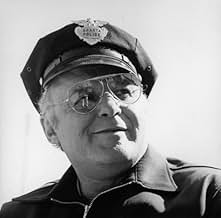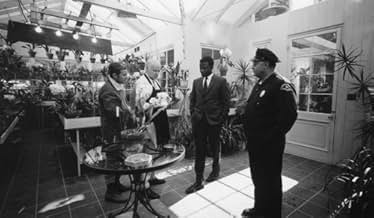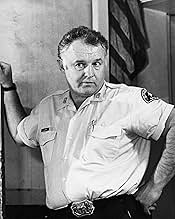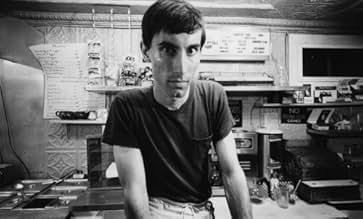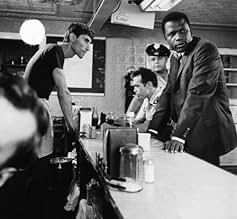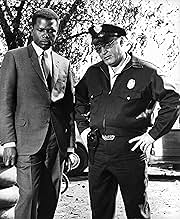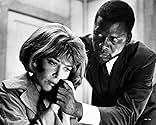Ein afroamerikanischer Polizeibeamter wird gebeten, einen Mord in einer rassistisch feindlichen südlichen Stadt zu untersuchen.Ein afroamerikanischer Polizeibeamter wird gebeten, einen Mord in einer rassistisch feindlichen südlichen Stadt zu untersuchen.Ein afroamerikanischer Polizeibeamter wird gebeten, einen Mord in einer rassistisch feindlichen südlichen Stadt zu untersuchen.
- Regie
- Drehbuch
- Hauptbesetzung
- 5 Oscars gewonnen
- 23 Gewinne & 16 Nominierungen insgesamt
William Watson
- McNeil
- (as William C. Watson)
Empfohlene Bewertungen
Gritty realism and a strong performance by Rod Steiger rev up the technical quality of this taut drama about a visiting Northern Black detective named Virgil Tibbs (Sidney Poitier) who gets nailed as a suspect, foolishly, in the murder of a local VIP, in a small town in Mississippi. Eventually, the town's White police chief, the gum chewing Gillespie (Rod Steiger), accepts Tibbs' innocence. And the two of them then work together, reluctantly, to solve the case.
Forty years after the film was made, the racial themes seem just a tad heavy-handed. Whites are always backward and racist. And Tibbs is smart, urbane, and sophisticated. But back in the 1960s, the filmmaker probably did need to be blunt. And the point is made that Blacks and Whites, working together, can accomplish worthy aims, even though old Black Joe is still pickin' cotton at the Endicott Cotton Company.
As a whodunit, the story is fairly good, convenient coincidences notwithstanding. The clue to the killer's identity is pleasantly subtle.
The film's cinematography and production design are terrific. Many scenes take place at night. And the opaque lighting makes for a moody, slightly dangerous look and feel. Loved how they photographed that train moving down the tracks in the Mississippi darkness, a metaphor related to the film's theme. And the sound of a train whistle adds to the mournful realism.
Interiors look authentic. The masking tape that covers rips in a big leather chair in Gillespie's shabby office is so true to life. A single white light bulb hangs down from the ceiling in a small neighborhood grocery store, where the shelves are filled with empty fruit jars. And that greasy spoon called Comptons reeks of 1960's Southern rural reality.
My only complaint with this film is the background music. Some of the jukebox songs are not consistent with the film's overall tone.
"In The Heat Of The Night" is a technically well made, and quite interesting, murder mystery. Yet, it will always be remembered, rightfully, as the film that offered hope of racial harmony, during a decade in which there was none. Its "Best Picture" Oscar award is thus explained.
Forty years after the film was made, the racial themes seem just a tad heavy-handed. Whites are always backward and racist. And Tibbs is smart, urbane, and sophisticated. But back in the 1960s, the filmmaker probably did need to be blunt. And the point is made that Blacks and Whites, working together, can accomplish worthy aims, even though old Black Joe is still pickin' cotton at the Endicott Cotton Company.
As a whodunit, the story is fairly good, convenient coincidences notwithstanding. The clue to the killer's identity is pleasantly subtle.
The film's cinematography and production design are terrific. Many scenes take place at night. And the opaque lighting makes for a moody, slightly dangerous look and feel. Loved how they photographed that train moving down the tracks in the Mississippi darkness, a metaphor related to the film's theme. And the sound of a train whistle adds to the mournful realism.
Interiors look authentic. The masking tape that covers rips in a big leather chair in Gillespie's shabby office is so true to life. A single white light bulb hangs down from the ceiling in a small neighborhood grocery store, where the shelves are filled with empty fruit jars. And that greasy spoon called Comptons reeks of 1960's Southern rural reality.
My only complaint with this film is the background music. Some of the jukebox songs are not consistent with the film's overall tone.
"In The Heat Of The Night" is a technically well made, and quite interesting, murder mystery. Yet, it will always be remembered, rightfully, as the film that offered hope of racial harmony, during a decade in which there was none. Its "Best Picture" Oscar award is thus explained.
'In the Heat of the Night' was the winner of five Oscars with Norman Jewison for Best Director and the sound editing also receiving nominations, all richly deserved, especially the Best Picture and Best Actor.
Although the Best Picture was a strong one, apart from 'Doctor Doolittle', 'In the Heat of the Night' this reviewer finds the best of the five and also one of the greatest films of the 60s.
Visually, 'In the Heat of the Night' is an incredibly well-made film with cinematography that's both beautiful and gritty. It is immaculately directed also by Norman Jewison, who directed several other great films, and film and sound editing are also very good, fluid with a suitable unpleasantness which suits the atmosphere well and thrillingly authentic. Quincy Jones' soundtrack at least fits and evokes some good atmosphere, the title song sung by Ray Charles is a classic.
The script is incredibly thought-provoking with the racial tension tensely and vividly drawn, never resorting to heavy-handedness or talking at you, something that films with heavy subjects don't always achieve. The "they call me Mr Tibbs" line is iconic. The story is a gripping powerhouse and very ahead of and daring for its time with tremendous power, edge and emotion.
Characters are compelling, and the acting couldn't have been better. Rod Steiger has never been better as the bigoted police chief, and Sidney Poitier matches him every step of the way in a subtler and no less powerful performance. Warren Oates and Anthony James stand out in the uniformly strong supporting cast.
Overall, fantastic film and one of the greatest films of its decade. 10/10 Bethany Cox
Although the Best Picture was a strong one, apart from 'Doctor Doolittle', 'In the Heat of the Night' this reviewer finds the best of the five and also one of the greatest films of the 60s.
Visually, 'In the Heat of the Night' is an incredibly well-made film with cinematography that's both beautiful and gritty. It is immaculately directed also by Norman Jewison, who directed several other great films, and film and sound editing are also very good, fluid with a suitable unpleasantness which suits the atmosphere well and thrillingly authentic. Quincy Jones' soundtrack at least fits and evokes some good atmosphere, the title song sung by Ray Charles is a classic.
The script is incredibly thought-provoking with the racial tension tensely and vividly drawn, never resorting to heavy-handedness or talking at you, something that films with heavy subjects don't always achieve. The "they call me Mr Tibbs" line is iconic. The story is a gripping powerhouse and very ahead of and daring for its time with tremendous power, edge and emotion.
Characters are compelling, and the acting couldn't have been better. Rod Steiger has never been better as the bigoted police chief, and Sidney Poitier matches him every step of the way in a subtler and no less powerful performance. Warren Oates and Anthony James stand out in the uniformly strong supporting cast.
Overall, fantastic film and one of the greatest films of its decade. 10/10 Bethany Cox
There are many bad "issues" movies out there, but this is not one of them. In a bad movie, all of the racist characters would be one dimensional and one hundred percent evil; here, Steiger is allowed to play a prejudiced man who is actually sympathetic and capable of growth (hence the Oscar). In a great twist, Virgil Tibbs himself is shown to be capable of prejudice, as he pursues Endicott without sufficient evidence. It's refreshing to see a movie that portrays the entire spectrum of racism, from the crazy extremists (and there are plenty of those on hand here) to the more subtly prejudiced.
"Mississippi Burning," a weaker effort, is not only more tediously didactic, but also less progressive; that film doesn't feature a protagonist like Virgil Tibbs, and instead focuses on the actions of two white federal agents. In this case, the old movie really is the better movie; produced at the height of the civil rights struggle, "In the Heat of the Night" feels more immediate and passionate than preachy films on the subject that were made years later, after the tension had died down.
Some reviewers complain that the mystery segments of the film are confusing, but I follow them without much trouble. Tibbs does a great Sherlock Holmes routine throughout, as he pieces together the solution based on clues that are also available to viewers. Sure, the ending is surprising, but it doesn't come entirely out of left field; I actually admire the subtle ways that clues are sewn throughout the film. If you're not used to mysteries, the barrage of red herrings and dead-end clues might surprise you, but it's pretty standard stuff for the genre.
I knew about the classic line "They call me Mr. Tibbs!" long before I actually saw this movie. I used to wonder why the line was so famous; it doesn't sound that exciting, does it? But when I finally heard Poitier say it in context, I asked my brother to pause the tape so I could cheer without missing any of the subsequent dialog. That's how excited I get during this movie. The performances are so naturalistic, and the racial conflict so vividly drawn, that I get pulled into the action completely. Though 1967 was a strong year for films, I still think that the right one got Best Picture, and not just because it was topical; "In the Heat of the Night" is a well-directed, superb character study, populated by some of the most vivid characters I've ever encountered in a movie.
"Mississippi Burning," a weaker effort, is not only more tediously didactic, but also less progressive; that film doesn't feature a protagonist like Virgil Tibbs, and instead focuses on the actions of two white federal agents. In this case, the old movie really is the better movie; produced at the height of the civil rights struggle, "In the Heat of the Night" feels more immediate and passionate than preachy films on the subject that were made years later, after the tension had died down.
Some reviewers complain that the mystery segments of the film are confusing, but I follow them without much trouble. Tibbs does a great Sherlock Holmes routine throughout, as he pieces together the solution based on clues that are also available to viewers. Sure, the ending is surprising, but it doesn't come entirely out of left field; I actually admire the subtle ways that clues are sewn throughout the film. If you're not used to mysteries, the barrage of red herrings and dead-end clues might surprise you, but it's pretty standard stuff for the genre.
I knew about the classic line "They call me Mr. Tibbs!" long before I actually saw this movie. I used to wonder why the line was so famous; it doesn't sound that exciting, does it? But when I finally heard Poitier say it in context, I asked my brother to pause the tape so I could cheer without missing any of the subsequent dialog. That's how excited I get during this movie. The performances are so naturalistic, and the racial conflict so vividly drawn, that I get pulled into the action completely. Though 1967 was a strong year for films, I still think that the right one got Best Picture, and not just because it was topical; "In the Heat of the Night" is a well-directed, superb character study, populated by some of the most vivid characters I've ever encountered in a movie.
In order to understand what's happening in In the Heat of the Night you have to realize that it is set in a very specific time period. The Civil Rights Act had been passed in 1964 and the Voting Rights Act was passed in 1965. But the impact of those laws was only beginning to be felt.
Especially the Voting Rights Act. The town of Sparta, Mississippi where William Schallert was Mayor and Rod Steiger was sheriff now has a significant new voting population and blacks might be a majority in that county. But even if they aren't, they know have a voice in the electoral process. Someone like Steiger has to take that into account now. Of course some of his deputies might not yet be with the program which explains why when a murder/robbery is committed of a very prominent northern businessman, Warren Oates sees fit to roust Sidney Poitier who's an unfamiliar black face in that town.
What a surprise they all get when they find out he's a top Philadelphia, Pennsylvania homicide detective and when his identity is established, his boss in Philly offers his services.
Poitier and Steiger both have to work through their prejudices, how each sees the other to solve this mystery which writer Stirling Silliphant gives us several red herrings before we learn the truth. Though Steiger got the Oscar for Best Actor, it should really have been a joint award. Their conflict and growing respect for each other drives the film. Steiger needs his expertise and respects him for that and Poitier comes to respect Steiger for his honesty.
Norman Jewison got great performances from his stars and the supporting cast of whom Warren Oates as the dimwit redneck deputy really shines.
Though set in a very narrow period of our history, In the Heat of the Night holds up very well with some eternal truths in its story. And it's the story of times that were a changing as one spokesman of the sixties put it.
Especially the Voting Rights Act. The town of Sparta, Mississippi where William Schallert was Mayor and Rod Steiger was sheriff now has a significant new voting population and blacks might be a majority in that county. But even if they aren't, they know have a voice in the electoral process. Someone like Steiger has to take that into account now. Of course some of his deputies might not yet be with the program which explains why when a murder/robbery is committed of a very prominent northern businessman, Warren Oates sees fit to roust Sidney Poitier who's an unfamiliar black face in that town.
What a surprise they all get when they find out he's a top Philadelphia, Pennsylvania homicide detective and when his identity is established, his boss in Philly offers his services.
Poitier and Steiger both have to work through their prejudices, how each sees the other to solve this mystery which writer Stirling Silliphant gives us several red herrings before we learn the truth. Though Steiger got the Oscar for Best Actor, it should really have been a joint award. Their conflict and growing respect for each other drives the film. Steiger needs his expertise and respects him for that and Poitier comes to respect Steiger for his honesty.
Norman Jewison got great performances from his stars and the supporting cast of whom Warren Oates as the dimwit redneck deputy really shines.
Though set in a very narrow period of our history, In the Heat of the Night holds up very well with some eternal truths in its story. And it's the story of times that were a changing as one spokesman of the sixties put it.
A well-done film of the raucous Civil Rights era, and should be standard viewing in classrooms.
Here's my breakdown:
STORY: Up front, it's only lightly dramatic, fueled by the socially-supported bigotry of that era.
What's very clever about this film is the way the story reveals itself in stages.
It's one of the best stories in that regard; it actually just gets better as the film progressives.
If you're not interested in the race struggles of that era then this film may not interest you.
ACTING: Even with a swath of "dumb redneck" characters, the whole cast are believable and hold their characters well.
Of course, Poitier and Steiger are simply awesome on their own and fireworks together. Really superb blend.
TEMPO: An excellent pace with nothing hyper or dull. With Steiger there's a lot of yelling (as was his custom).
CINEMATOGRAPHY: Love old films, and settings all by themselves. If you want to step back into time and literally see what the "Old South" was like, watch this.
DIRECTING / WRITING: Excellent directing and writing ... so much attention to detail and the handling of the subject. My only critique is the screenplay was written by a man who did so primarily for TV, and it occasionally shows.
Is it a very good film? Yes.
Should you watch this once? A must.
Rating: 8.1.
Here's my breakdown:
STORY: Up front, it's only lightly dramatic, fueled by the socially-supported bigotry of that era.
What's very clever about this film is the way the story reveals itself in stages.
It's one of the best stories in that regard; it actually just gets better as the film progressives.
If you're not interested in the race struggles of that era then this film may not interest you.
ACTING: Even with a swath of "dumb redneck" characters, the whole cast are believable and hold their characters well.
Of course, Poitier and Steiger are simply awesome on their own and fireworks together. Really superb blend.
TEMPO: An excellent pace with nothing hyper or dull. With Steiger there's a lot of yelling (as was his custom).
CINEMATOGRAPHY: Love old films, and settings all by themselves. If you want to step back into time and literally see what the "Old South" was like, watch this.
DIRECTING / WRITING: Excellent directing and writing ... so much attention to detail and the handling of the subject. My only critique is the screenplay was written by a man who did so primarily for TV, and it occasionally shows.
Is it a very good film? Yes.
Should you watch this once? A must.
Rating: 8.1.
Oscars Best Picture Winners, Ranked
Oscars Best Picture Winners, Ranked
See the complete list of Oscars Best Picture winners, ranked by IMDb ratings.
Wusstest du schon
- WissenswertesSidney Poitier insisted that the movie be filmed in the North because of an incident in which he and Harry Belafonte were almost killed by Ku Klux Klansmen during a visit to Mississippi. That's why Sparta, IL, was chosen for location filming. Nevertheless, the filmmakers and actors did venture briefly into Tennessee for the outdoor scenes at the cotton plantation, because there was no similar cotton plantation in Illinois that could be used. Poitier slept with a gun under his pillow during production in Tennessee. He did receive threats from local racist thugs, so the shoot was cut short and production returned to Illinois.
- PatzerThe police chase Harvey Oberst through the yellow leaves of an autumn forest, clearly indicating that it is not the middle of summer, as claimed in the movie. This film takes place in September, as indicated by the calendar in the Sheriff's office and not summer.
- Zitate
Gillespie: Virgil? That's a funny name for a nigger boy that comes from Philadelphia. What do they call you up there?
Virgil Tibbs: They call me MISTER TIBBS!
- Crazy CreditsNo uppercase ("capital") letters are used in the opening and closing credits, including the film's title, cast and characters, crew and job titles, and company credits.
- Alternative VersionenThe opening MGM and 2002 United Artists logos in addition to the closing MGM logo originally appeared in the 2008 DVD and Blu-ray prints. But in the Criterion Blu-ray and Kino Lorber 4K release, the MGM logos were plastered with the 2012 variants.
- VerbindungenFeatured in Film Review: Film Review (1967)
- SoundtracksIn the Heat of the Night
Music by Quincy Jones (uncredited)
Lyrics by Alan Bergman (uncredited) and Marilyn Bergman (uncredited)
Sung by Ray Charles
Top-Auswahl
Melde dich zum Bewerten an und greife auf die Watchlist für personalisierte Empfehlungen zu.
Details
- Erscheinungsdatum
- Herkunftsland
- Sprache
- Auch bekannt als
- Al calor de la noche
- Drehorte
- Sparta, Illinois, USA(Sparta, Mississippi)
- Produktionsfirma
- Weitere beteiligte Unternehmen bei IMDbPro anzeigen
Box Office
- Budget
- 2.000.000 $ (geschätzt)
- Weltweiter Bruttoertrag
- 27.669 $
- Laufzeit1 Stunde 50 Minuten
- Farbe
- Seitenverhältnis
- 1.85 : 1
Zu dieser Seite beitragen
Bearbeitung vorschlagen oder fehlenden Inhalt hinzufügen





